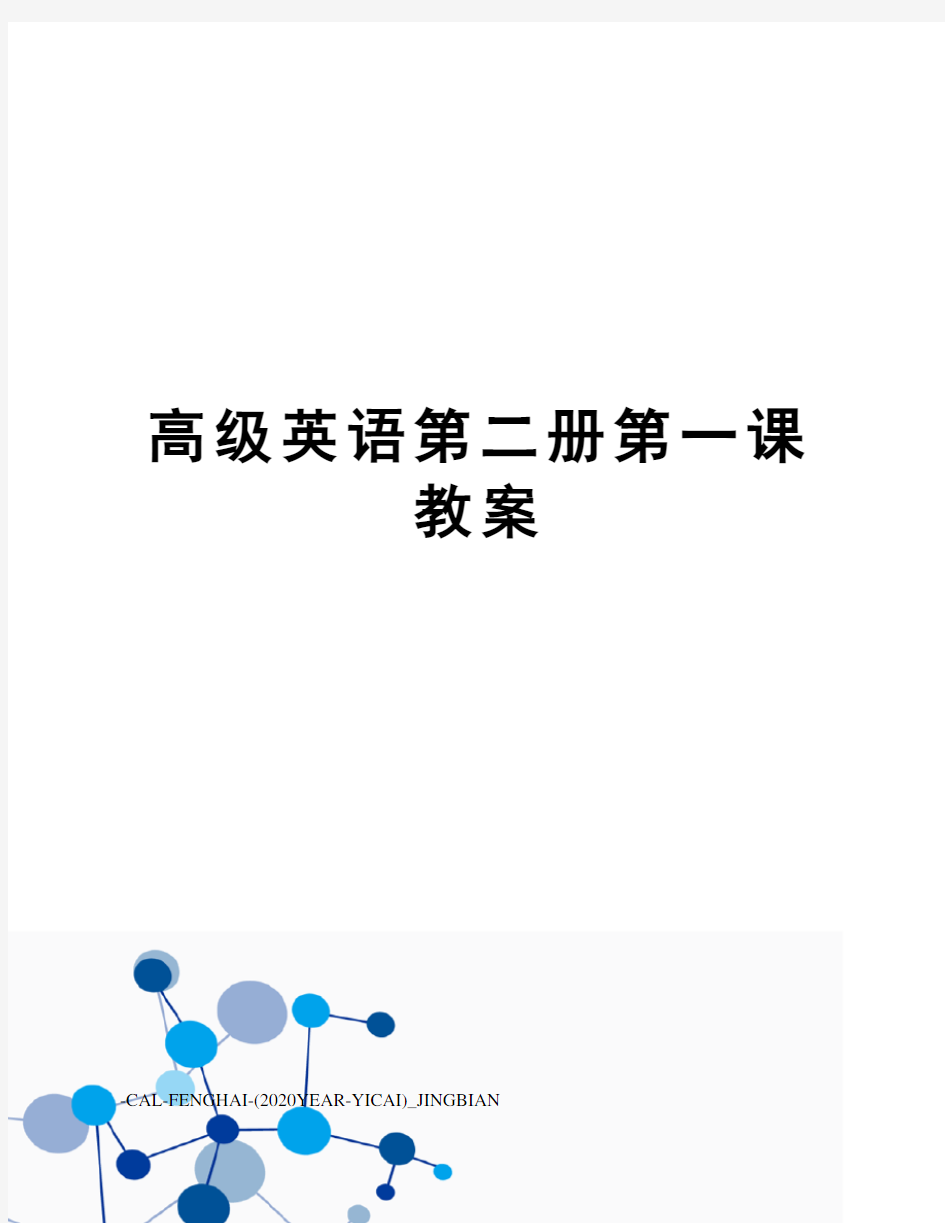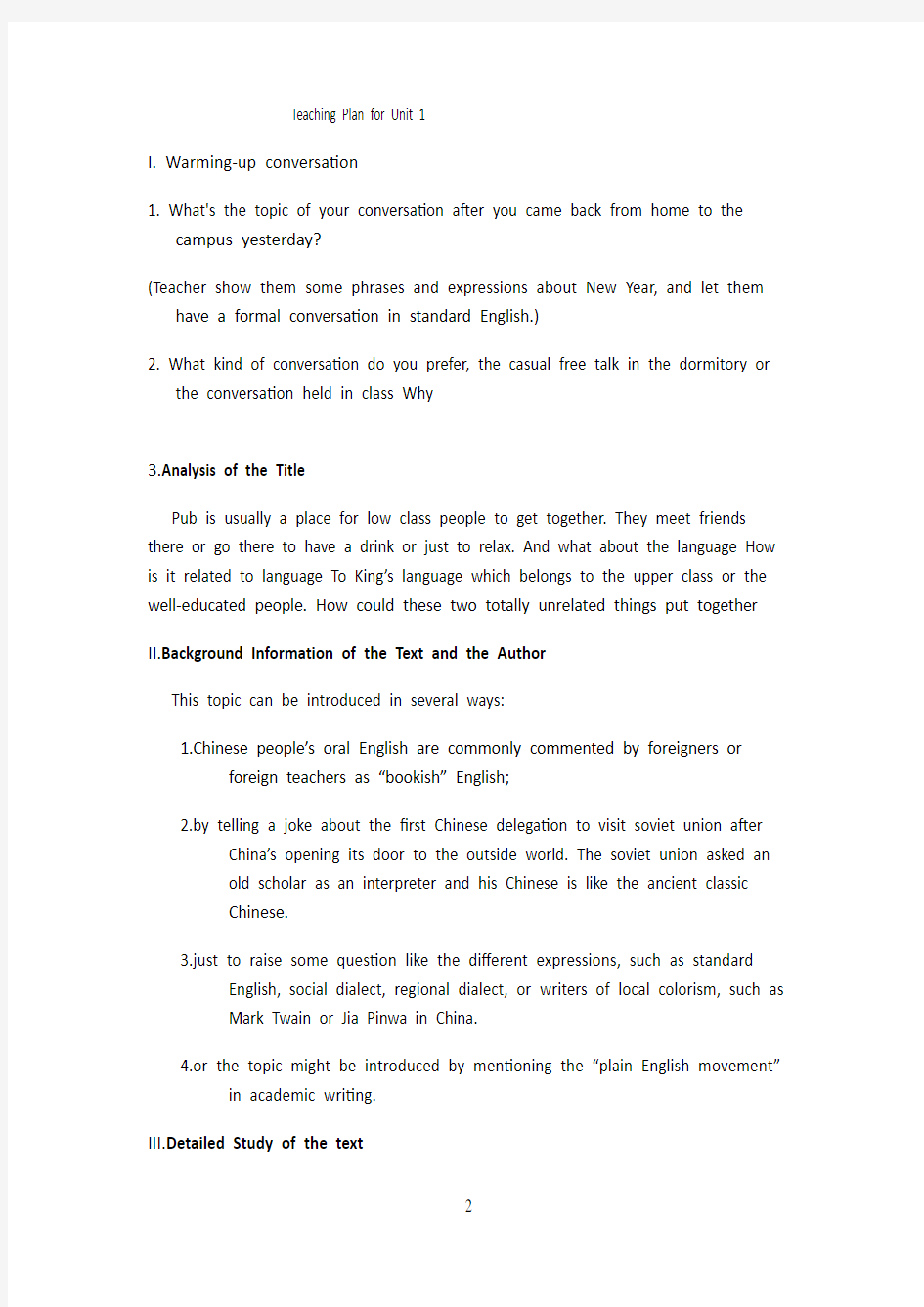高级英语第二册第一课教案


高级英语第二册第一课
教案
-CAL-FENGHAI-(2020YEAR-YICAI)_JINGBIAN
Teaching Plan for Unit 1
I. Warming-up conversation
1. What's the topic of your conversation after you came back from home to the
campus yesterday?
(Teacher show them some phrases and expressions about New Year, and let them have a formal conversation in standard English.)
2. What kind of conversation do you prefer, the casual free talk in the dormitory or
the conversation held in class Why
3.Analysis of the Title
Pub is usually a place for low class people to get together. They meet friends there or go there to have a drink or just to relax. And what about the language How is it related to language To King’s language which belongs to the upper class or the well-educated people. How could these two totally unrelated things put together
II.Background Information of the Text and the Author
This topic can be introduced in several ways:
1.Chinese people’s oral English are commonly commented by foreigners or
foreign teachers as “bookish” English;
2.by telling a joke about the first Chinese delegation to visit soviet union after
China’s opening its door to the outside world. The soviet union asked an
old scholar as an interpreter and his Chinese is like the ancient classic
Chinese.
3.just to raise some question like the different expressions, such as standard
English, social dialect, regional dialect, or writers of local colorism, such as
Mark Twain or Jia Pinwa in China.
4.or the topic might be introduced by mentioning the “plain English movement”
in academic writing.
III.Detailed Study of the text
Paragraph 1-4 Introductory part
The students should pay special attention in this part to how the topic is ushered in.
1.the definition of conversation: how human is different from the animal.
Conversation is human-specific. [remember that in the first para animal is
concerned and in the last para this is echoed back.]
2.the charm of conversation: no one knows where it starts and where it ends. In
this para, one sentence is special.
“… as it meanders or leaps and spark les or just glows”
how could we draw a tree diagram to illustrate its syntactic structure
3.the introducing of pub talk in Britain. The characteristics of pub talk – not
deeply involved in other people’s lives.
sparkle verb [I]
1 to shine brightly with a lot of small points of light:
The snow/sea sparkled in the sunlight.
2 If a person or performance sparkles, they are energetic, interesting and exciting:
Alice is shy and quiet at parties, but her sister really sparkles!
4.in a pub talk, “the king’s English” became a topic. That is a very natural way to
introduce the topic.
In a way, this reminds us of the ways to introduce a topic mentioned by Aristotle. Through an anecdote. And in the first two paragraphs, the topic is introduced in a top-down fashion.
desultory adjective FORMAL without a clear plan or purpose and showing little effort or interest:
She made a desultory attempt at conversation.
He wandered around, clearing up in a desultory way.
desultorily adverb FORMAL
alchemy noun [U]
1 a type of chemistry, especially from about 1100 to 1500, which dealt with trying to find a way to change ordinary metals into gold and with trying to find a medicine which would cure any disease
2 a process that is so effective that it seems like magic:
She manages, by some extraordinary alchemy, to turn the most ordinary of ingredients into the most delicious of dishes.
tart (BEHAVIOUR) adjective (especially of a way of speaking) quick or sharp and unpleasant:
a tart remark/comment/reply
Paragraph 5-8 very detailed and concrete description of the
instance of a pub conversation –the king’s English case. It is presented in such a way to show or to illustrate the characteristics of charms of pub talk – it is free talk and aimless. The talk goes from the British pub to Australia, then to the Saxon churls and the
Norman conquerors.
It serves as an example to illustrate the point. It is much better than logically reasoning and debating. I will say that the author employs the case study method here.
In this part, one pattern in ending paras is emerging.
1.They are ready to let it go. In para
2.
2.it could still go ignorantly on. In para 6.
3.The conversation was on wings. In para 8.
4.we are still the heirs to it. In para 11
5.… and it rings true. In para 12
churl: a medieval peasant; a rude ill-bred person.
snob noun [C] MAINLY DISAPPROVING a person who respects and likes only people who are of a high social class, and/or a person who has extremely high standards who is not satisfied by the things that ordinary people like:
He's a frightful snob - if you haven't been to the right school he probably won't even speak to you.
I'm afraid I'm a bit of a wine snob/a snob where wine is concerned.
snobbish like a snob:
My brother is very snobbish about cars.
snobbery noun [U] (ALSO snobbishness) DISAPPROVING behaviour and opinions that are typical of a snob:
She accused me of snobbery because I sent my sons to a private school.
Paragraph 9 A typical example to illustrate what is “king’s English”.
The students will be asked to translate this paragraph as a home assignment.
It is a real challenge to translate this para in that there are so many synonyms in English but less synonyms in Chinese. This is especially true for the colloquial expressions.
Paragraph 10-14 the problem of bilingualism is a manifestation of the social struggles between the dominant upper class and the exploited lower class. Then, as is typical in conversation, the topic moves to the bilingual education situation in America today.
The topic then moves to the etymology of the “king’s English” itself. In other words, it is approached from a linguistic perspective.
Then, the diachronic variation of the phrase. Then the sociological factors are involved in the topic.
tussle (FIGHT) verb [I] to fight with another person using your arms and body:
The boys started to tussle in the corridor.
tussle noun [C usually singular]
From the state of his clothes and hair, he had been in a tussle.
In para 11, there is a sentence:
And there in America now, 900 years later, we are still the heirs of it.
What does “it” refer to The French influence of that time, or facing the same problem of having two languages existing side by side.
Paragraph 15-20 the languages used by the different social classes.
Some of the misunderstanding of the language use in different
situation even for the same person.
Para 15 the difference in language use between the two conflicting classes. The poking jokes of the lower class people on the so called upper class.
underlings: -ling is actually a suffix indicating “smallness, young”. Such as duckling,
edict: order, decree.
ultimatum noun [C] plural ultimatums or ultimata
a threat in which a person or group of people are warned that if they do not do a particular thing, something unpleasant will happen to them. It is usually the last and most extreme in a series of actions taken to bring about a particular result:
He gave her an ultimatum - she could either stop seeing Peter and come back to him or it was divorce.
On Wednesday night the UN issued its toughest ultimatum to date, demanding that all troops withdraw from the city.
